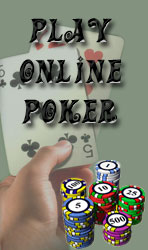Pokerwiner.com → Lessons of poker
IMPLIED ODDS IN POT-LIMIT AND NO-LIMIT GAMES
In general, the larger the difference between future bets and the present bet you have to call, the greater your implied odds.
Hence, implied odds become most significant in pot-limit games and in no-limit games, where a future bet can be as large as the amount of money a player has in front of him.
In fact, in these games one is almost always considering not how much is in the pot odds right now, but rather how much can be won on a future round of betting.
A classic illustration of such a situation occurred in the final hand of the 1980 no-limit holdem championship at Binion’s Horseshoe Casino in Las Vegas.
Doyle Brunson, a two-time world champion, had $232, 500 in front of him, and his opponent, young Stu Ungar, a gin rummy and poker whiz from New York’s lower East Side, had $497,500. (These astronomical sums resulted from 73 players buying into the championship tournament for $10,000 apiece.)
In the final hand Brunson held an ace, 7, and Ungar, the 4 and 5 of spades. Before the flop, $30,000 went into the pot, and then the cards came ace, 2,7.
Ungar checked, but looking at aces and 7s, brunson bet $17,000, a bet intended to lure Ungar in.
I wouldn’t have called too much more than that for a gut shot,” Ungar admitted. (A gut shot in poker parlance is a draw to an inside straight.) “But if Doyle has a hand, it’s worth $17,000, because if I do catch a 3, I’m going to bust him.”
Unger’s call was strictly in terms of the implied odds he was getting. He had no thought for the $47,000 in the pot at the moment, which gave him less than 3-to-1 odds, but rather for Brunson’s entire $232,500, stake.
With $15,000 of his own money also in the pot, Unger’s implied odds were approximately 14½-to-1; and with four 3s available among the 47 unseen cards, the odds against making the straight on the next card were 10¾-to-1. Hence his call.
Needless to say, a 3 fell on fourth street. Ungar bet $40,000. After some reflection, brunson moved all-in with the remainder of his chips.
Since Ungar had the nuts at that point (Brunson’s only outs were an ace or a 7 on the last card to make a full house) he called gleefully and won the world championship.
At a poker seminar in Gardena, California, the following year, given by Brunson, myself, and Draw Poker expert Mike Caro, brunson acknowledged he played incorrectly in betting $17,000 on the flop.
He said that instead of giving Ungar the chance for a perfect card, he should have bet more than Ungar would have been able to call, in the event he did have an inside-straight draw – in other words, too much to warrant a call even in terms of implied odds.
When you estimate your implied odds, you must try to predict how much money you can win if you do make your hand. This prediction depends on three factors
1. The size of future bets.
2. How hidden your hand is.
3. The ability of your opponents.
FACTORS IN DETERMINING IMPLIED ODDS
Obviously, the larger the size of potential bets, the greater your implied odds and the more reason you have to call with a hand that might improve to the nuts. However, the other two factors are important too.
In adding the possibility of future bets to the present pot to get your implied odds, you should take into account whether the strength of your hand is hidden.
When the cards that help are obvious, you cannot expect to get as much value out of your hand if you make it, since opponents simply might not call when you bet.
When you have a close decision, you should call a bet against weaker opponents more readily than against tougher ones: You can usually assume you are getting higher implied odds from a weak player, who is more likely to call your bet or raise when you make your hand, than from a tough player, who may fold his hand and pot not pay you off.
Two words of caution. Implied odds obviously cannot apply when either you or your opponent is already all-in or nearly all-in. Secondly, implied odds have little meaning when there is a decent chance that you can make your hand but still wind up second best.
If you are going to take a short price from the pot in hopes of winning future bets, you had better be awfully sure that your hand will hold up when you make it.



